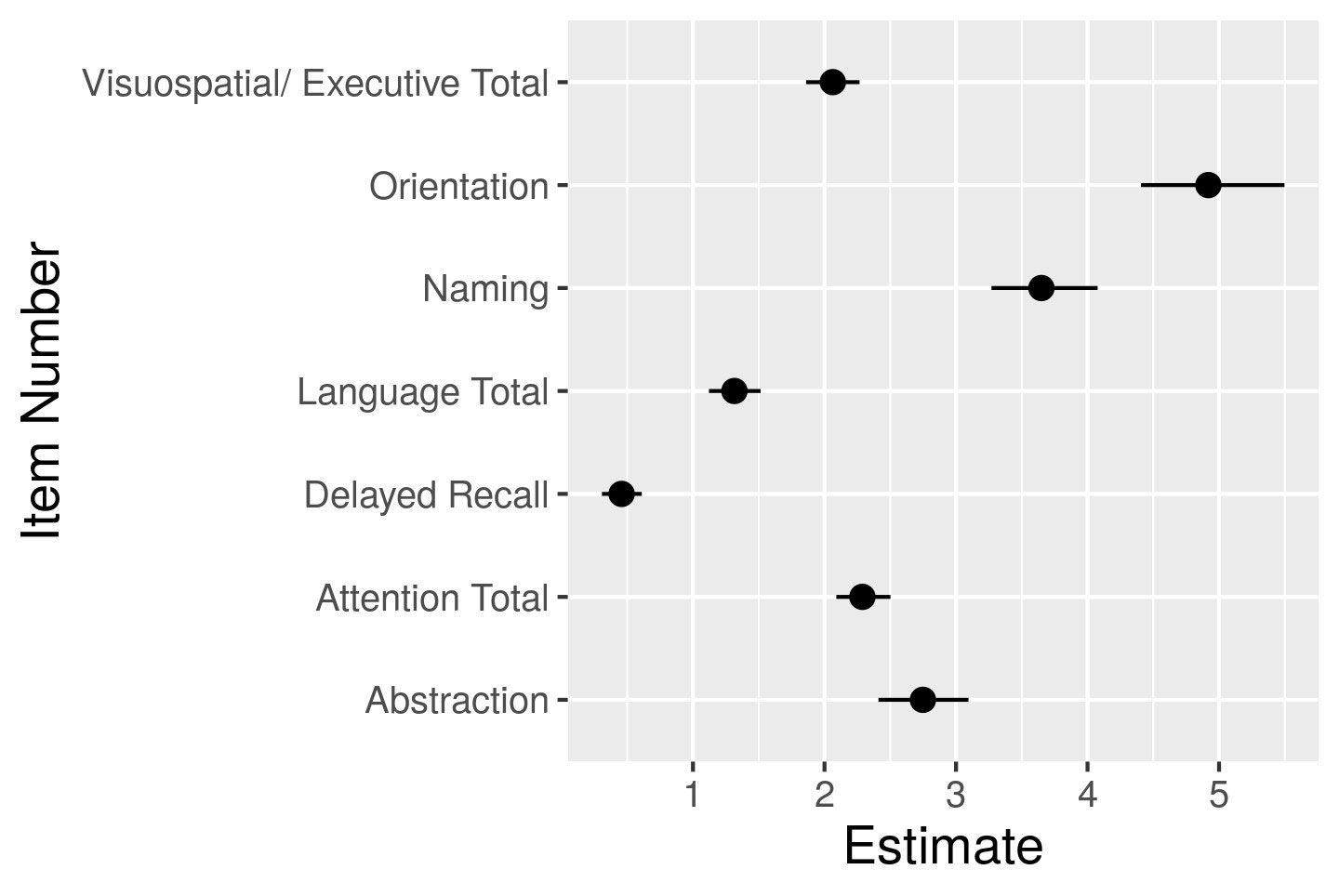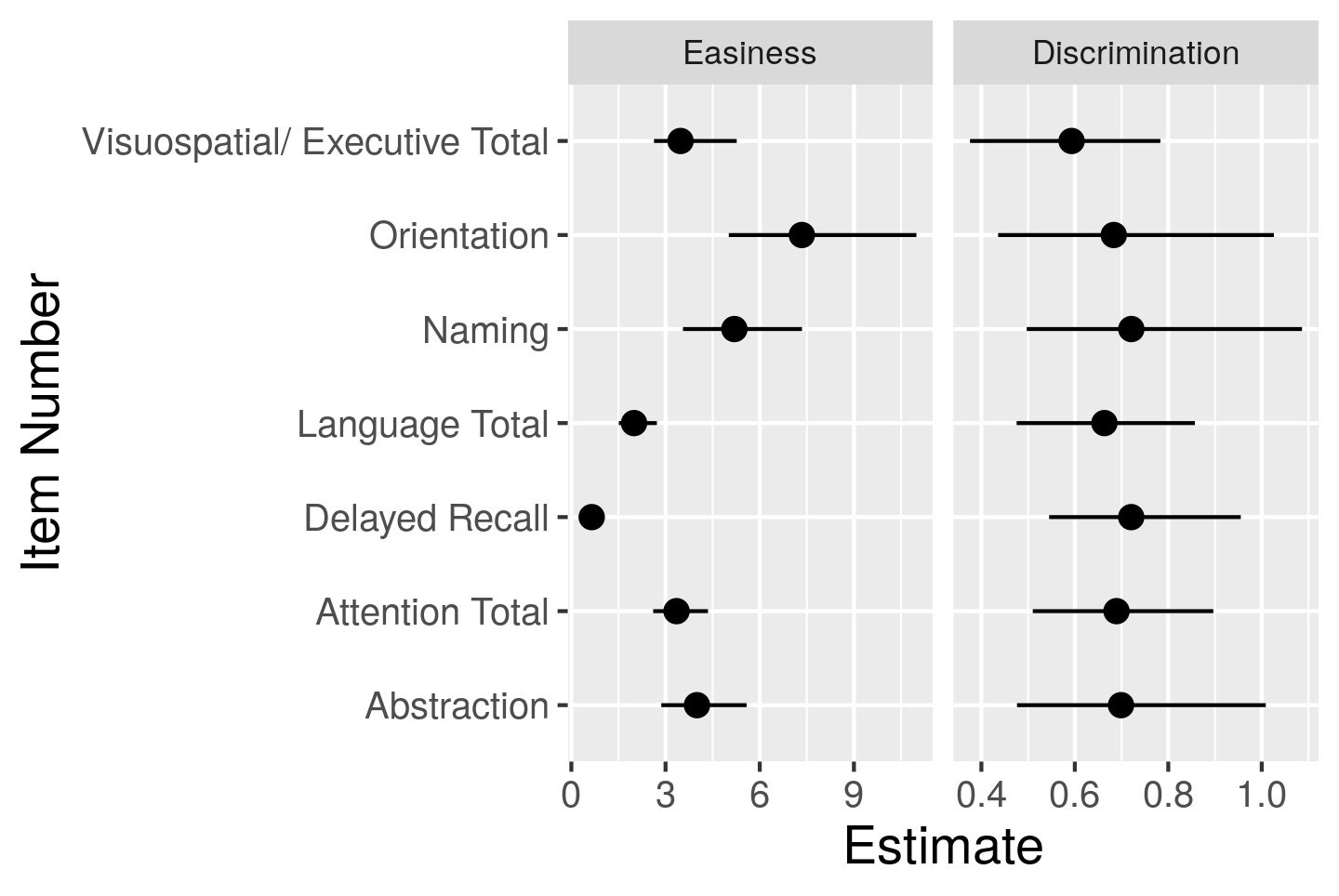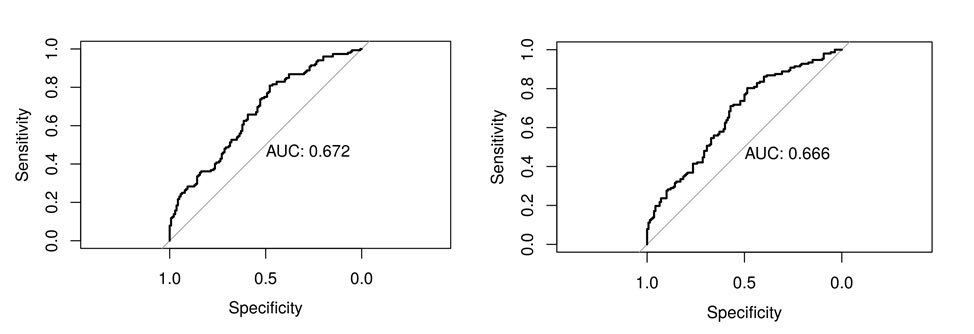Session Information
Date: Saturday, November 12, 2022
Title: SLE – Diagnosis, Manifestations, and Outcomes Poster I: Diagnosis
Session Type: Poster Session A
Session Time: 1:00PM-3:00PM
Background/Purpose: Cognitive impairment (CI) is one of the most common manifestations of neuropsychiatric syndromes in patients with SLE, with a prevalence ranging from 20% to 80% and a pooled prevalence of 38%. Previous studies have assessed the utility of the Montreal Cognitive Assessment (MoCA) as a screening tool for CI in SLE patients compared to the American College of Rheumatology neuropsychological battery (ACR-NB), where the performance of the MoCA in the identification of CI has been historically evaluated using a total score of 26 as the threshold. Instead of using this threshold, this study fits an item response theory (IRT) model to the MoCA questionnaire and compares its results to the ACR-NB to assess the utility of the MoCA as a stand-alone screening test.
Methods: Adult SLE patients who attended the University of Toronto Lupus Clinic between July 2016 and March 2020 (excluding those with learning disabilities and less than semi-fluent English language skills) were administered the MoCA followed by the ACR-NB. Patients were classified as having CI if they had a z-score of ≤-1.5 in ≥2 domains of the 6 domains of the ACR-NB, and otherwise non-CI. Using a Bayesian framework, different IRT models with a beta-binomial distribution were used in this analysis. IRT models aim to model persons’ responses on a set of items measuring one or more latent constructs, which in our case this latent construct corresponds to CI in SLE patients. Specifically, we fitted 1PL and 2PL models, where the 1PL model estimates the “easiness” of each item (i.e., agreement across patients) and the 2PL adds a discrimination parameter for each item (i.e., not assuming that discriminations are to be constant across items). The performance of both IRT models using the MoCA in the identification of CI as classified by the ACR-NB was evaluated using ROC curve analysis and AUC calculation.
Results: A total of 276 SLE patients were enrolled; 88.8% were female and mean age and mean SLE disease duration at study visit were 41.3 ± 12.1 and 14.4 ± 10.1 years, respectively. Based on the ACR-NB, 129 patients (47%) were classified as having CI, 85 (31%) as undetermined CI, and 62 (22%) as non-CI patients. The 1PL model showed that some items (e.g., Orientation) were consistent amongst most individuals (agreement amongst patients) and thus had strongly positive easiness parameters (Figure 1), while other items (e.g., Delayed Recall) were mostly rejected and thus had a low easiness parameter. For the 2PL model, the easiness parameters displayed on the left-hand side of (Figure 2) still showed a similar pattern as in the 1PL, although their estimates were more spread out because of the discrimination estimates being less than 1. CI was poorly predicted by both IRT models (Figure 3) based on MoCA with an area under curve (AUC) of 67.2% for the 1PL model and 66.6% by the 2PL model.
Conclusion: This study found that the utility of the MoCA in screening for CI in SLE patients is limited. Future research should focus on other IRT models with different response distributions in order to determine if the accuracy of the MoCA could be improved by deriving a different weight score for each domain.
To cite this abstract in AMA style:
Diaz-Martinez J, Barraclough M, Yuen K, Tayer-Shifman O, Knight A, Bingham K, Su J, Kakvan M, Munoz C, Tartaglia M, Ruttan L, Wither J, Choi M, Bonilla D, Appenzeller S, Katz P, Beaton D, Green R, Touma Z. Assessing the Utility of the Montreal Cognitive Assessment as a Screening Tool for Cognitive Impairment in Patients with SLE Using a Bayesian Item-Response Theory Model [abstract]. Arthritis Rheumatol. 2022; 74 (suppl 9). https://acrabstracts.org/abstract/assessing-the-utility-of-the-montreal-cognitive-assessment-as-a-screening-tool-for-cognitive-impairment-in-patients-with-sle-using-a-bayesian-item-response-theory-model/. Accessed .« Back to ACR Convergence 2022
ACR Meeting Abstracts - https://acrabstracts.org/abstract/assessing-the-utility-of-the-montreal-cognitive-assessment-as-a-screening-tool-for-cognitive-impairment-in-patients-with-sle-using-a-bayesian-item-response-theory-model/



